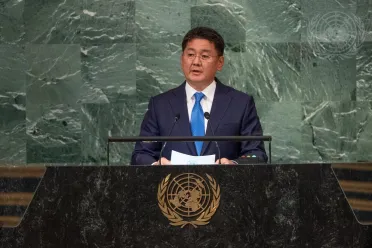Statement
Statement summary
KHURELSUKH UKHNAA, President of Mongolia, said that, according to a Stockholm International Peace Research Institute report, even in difficult times, when countries were closing their borders and imposing restrictions and quarantines during the pandemic, the world military expenditure continued to grow in 2021, reaching an all-time high of $2.1 trillion. “It is time for all of us to reflect on what progress could have been achieved if this huge amount of money had been spent on combating global warming and climate change,” he underscored. The “Pax Mongolica”, established by Chinggis Khan, was an important contribution of Mongols to world history and laid the foundation for diplomacy and exchange of envoys. Its progressive ideas could form the basis of collective efforts to maintain peace and stability, he said, calling on the international community to manage conflict through peaceful dialogue. Noting his country’s declaration of itself as a nuclear‑weapon‑free zone, he urged all Member States to exert political will to build a world free of such arms.
The year 2022 marks the twentieth anniversary of Mongolia’s participation in United Nations peacekeeping operations, he said, noting that, during this period, more than 20,000 of its military personnel have served in the United Nations and other international peacekeeping operations in hot spots around the world. Mongolia sent its first female officer to the Organization’s peacekeeping operations in 2006 and ranks among the top 20 troop-contributing countries in the number of female peacekeepers. Firmly committed to implementation of Council resolution 1325 (2000) on women, peace and security and the United Nations call to increase the number of females serving in its peacekeeping operations to 15 per cent by 2027, his country recently hosted an international conference on “Strengthening the Role of Women in Peacekeeping”. The conference brought together female peacekeepers from more than 30 countries and representatives of international organizations, to exchange knowledge, experiences and lessons learned. Mongolia has put forward an initiative to host this conference every five years, he said, calling for United Nations and troop-contributing countries’ support for the proposal.
Turning to efforts to denuclearize the Korean Peninsula, he said his country organized in June the seventh international conference of the “Ulaanbaatar Dialogue on Northeast Asian Security” where a broad range of issues, including regional security, power grid, green development, humanitarian cooperation and post-COVID economic recovery, were discussed. Given the frequency of natural hazards and communicable diseases, the creation of an integrated regional infrastructure for disaster risk reduction and humanitarian assistance is becoming one of the most pressing security issues in North-East Asia, he added. In that regard, his country put forward an initiative to establish an integrated platform for disaster risk reduction for the North-East Asian region in Mongolia in 2018. On the pandemic, he said 70 per cent of Mongolia’s population are fully vaccinated, its domestic restrictions removed and borders opened. His Government’s new recovery policy, developed in line with the Sustainable Development Goals, focuses on improvement of road, railway and border point infrastructure, increase of energy sources and intensification of industrialization, among others. To accelerate digital transition, his country adopted laws on digital development. The e-Mongolia platform streamlines public service delivery to citizens and entities, to reduce corruption and bureaucracy, increase information security and promote good governance.
His country — one of the most affected by climate change — has launched the “Billion Trees” national movement to plant, grow and protect trees, he said, noting that the Secretary-General personally joined and supported the movement. Mongolia will be hosting the seventeenth session of the Conference of the Parties to the United Nations Convention to Combat Desertification in 2026. Noting the scarcity of pastures due to shrinking space for nomadic livestock, he warned that nomadic civilization is facing the danger of extinction. “We, Mongolians, are nomadic and pastoralist people. The lives of over 200 million people, raising livestock and living in harmony with nature like us, are at risk now due to climate change, land degradation, desertification, drought and extreme winter calamities,” he underscored. To protect their interests, improve pasture management and use, preserve ecosystem balance, and provide global food security and supply, his country initiated a General Assembly resolution proclaiming 2026 as the “International year of Rangelands and Pastoralists”, which was adopted on 15 March.
Full statement
Read the full statement, in PDF format.
Photo

Previous sessions
Access the statements from previous sessions.
